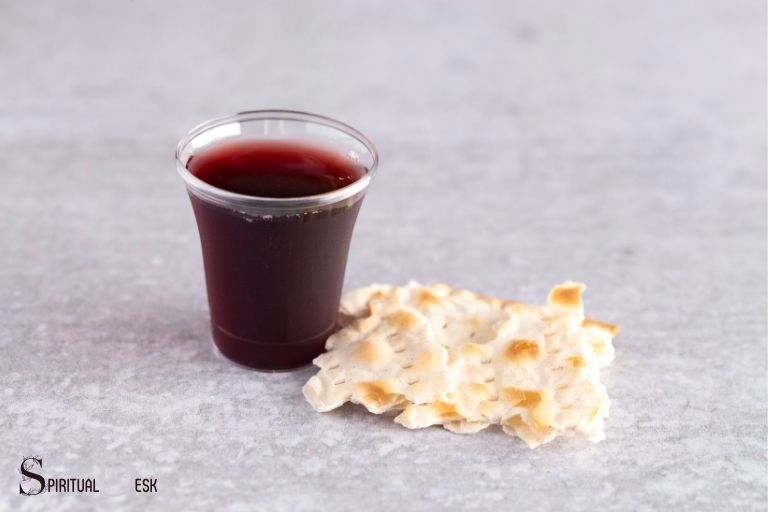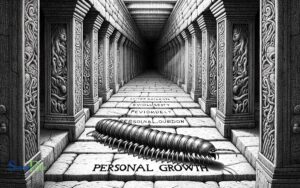What is the Spiritual Meaning of Unleavened Bread? Purity!
The spiritual meaning of unleavened bread is a symbol of purity, humility, and a life free from sin and corruption.
Unleavened bread, also known as matzo or matzah, is made without yeast or any other leavening agent. In various religious contexts, it holds significant spiritual meaning.
For example, in Christianity, unleavened bread is often used during communion, symbolizing the body of Christ.
In Judaism, it plays a central role in the celebration of Passover, commemorating the Israelites’ escape from slavery in Egypt.
Unleavened bread carries a powerful spiritual symbolism that extends beyond its humble ingredients.
As a representation of purity and simplicity, it serves as a reminder for believers to strive for a life free from sin and corruption.
In both Jewish and Christian traditions, unleavened bread plays a crucial role in ceremonies, emphasizing the importance of maintaining spiritual integrity and humility in one’s faith journey.
6 Aspects: Spiritual Meaning of Unleavened Bread
| Spiritual Aspect | Meaning of Unleavened Bread |
|---|---|
| Purity | Unleavened bread represents purity, as leaven (yeast) is often associated with sin or corruption in spiritual texts. The absence of leaven signifies a pure, untainted offering. |
| Humility | Unleavened bread is simple and unpretentious, symbolizing humility and the rejection of inflated egos or self-centeredness. In a spiritual context, this represents the importance of being humble and modest in one’s actions and thoughts. |
| Quick Preparation | Unleavened bread can be prepared quickly compared to leavened bread, which requires time to rise. In a spiritual context, this symbolizes the need for readiness and urgency in preparing oneself for a spiritual journey or transformation. |
| Sustenance | Unleavened bread, while less flavorful and satisfying than leavened bread, still provides physical nourishment. This highlights the importance of spiritual sustenance and the idea that one’s spiritual needs should always be prioritized. |
| Freedom | Unleavened bread is often associated with the Jewish holiday of Passover, during which it is eaten to commemorate the Israelites’ escape from slavery in Egypt. In a broader spiritual sense, this signifies the liberation from worldly attachments and the pursuit of spiritual freedom. |
| Obedience | Unleavened bread’s simplicity and quick preparation symbolize obedience to a higher power or spiritual principles, demonstrating a willingness to follow divine guidance without hesitation or resistance. |
Key Takeaway

Five Facts About: Spiritual Meaning Of Unleavened Bread
The Basics Of Unleavened Bread
Unleavened bread is a type of bread that does not contain yeast, baking powder, or any leavening agents. It is also known as matzo, matzah, or matzoh.
But what is the significance of this bread?
We will explore the spiritual meaning of unleavened bread and its importance to the jewish tradition.
Definition Of Unleavened Bread
Unleavened bread is made from flour and water, without any leavening agents. Because of the absence of yeast or any other rising agent, it does not go through the process of fermentation, leading to its characteristic flat, dense appearance.
Unleavened bread is typically thin, crisp, and brittle, with a light brown color.
Different Types Of Unleavened Bread
Many cultures have their own versions of unleavened bread, but the most well-known types are:
- Matzo: This is the most common type of unleavened bread and is traditionally eaten by jews during the passover holiday. Matzo is made of flour and water and may contain a small amount of salt.
- Lavash: This is a type of armenian flatbread that is made from wheat flour, water, and salt. It is often used as a wrap for kebab and other mediterranean dishes.
- Tortilla: This is a type of mexican flatbread that is made from corn or wheat flour, water, and salt. It is often used to make tacos, burritos, and quesadillas.
Importance Of Unleavened Bread To The Jewish Tradition
In jewish tradition, unleavened bread holds significant spiritual meaning as it signifies the exodus of the israelites from egypt.
When the israelites were slaves in egypt, they were forced to make bread quickly, without allowing it to rise.
Thus, eating unleavened bread during the passover holiday is a reminder of their hardships and liberation.
But unleavened bread also symbolizes humility and the importance of spiritual purity. When eating unleavened bread, one is supposed to abstain from any form of leavened food, which includes bread, cake, and other fermented products.
This symbolizes a spiritual cleansing and a return to the basics, free from the temptations of impure materialistic desires.
Unleavened bread carries great spiritual significance in the jewish tradition and serves as a lesson in humility, perseverance, and spiritual purity.
Its basic ingredients and simple preparation process remind us of what is truly important in life – love, faith, and family.
Unleavened Bread In The Bible
Unleavened bread, also known as matzah, has a significant spiritual meaning in the bible.
The israelites were commanded to eat unleavened bread during the passover festival, which symbolizes their hasty departure from egypt. However, the spiritual significance of unleavened bread goes beyond this historical event.
Let’s take a closer look at the biblical references of unleavened bread and its symbolism.
Historical References To Unleavened Bread In The Bible
- The first biblical reference to unleavened bread can be found in the book of exodus, where the israelites are commanded to prepare unleavened bread for their journey out of egypt. According to the bible, they did not have time to let the bread rise before hastily leaving egypt.
- During the passover festival, unleavened bread symbolizes the israelites’ freedom from slavery in egypt and their faith in god’s protection. Eating unleavened bread during this time is a reminder of god’s faithfulness to his people.
Biblical Significance And Symbolism Of Unleavened Bread
- The absence of leaven in unleavened bread represents the removal of sin from our lives. In the bible, leaven is often a symbol of sin and corruption. By eating unleavened bread, we are committing to a life of purity and righteousness.
- Unleavened bread also represents the unity and oneness of the church. Just as the bread is made up of one substance, the church is made up of many members who are all one body in christ. Eating unleavened bread together is a reminder of our connection to each other and to god.
Unleavened Bread As A Representation Of Purity And Freedom
- Eating unleavened bread during the passover festival is a reminder of the israelites’ freedom from slavery. The bread symbolizes their escape from the bondage of egypt and their journey to the promised land. In the same way, eating unleavened bread today reminds us of the freedom we have in christ.
- Unleavened bread also represents purity. By removing leaven from the bread, we are removing sin from our lives. Eating unleavened bread is a reminder of our commitment to live a life free from sin and corruption.
Unleavened bread has a rich spiritual meaning in the bible. From its historical significance to its symbolism of purity and freedom, it serves as a reminder of god’s faithfulness and our commitment to follow him.
The Spiritual Meaning Of Unleavened Bread
Symbolism Of Unleavened Bread In Christian Tradition
Unleavened bread is a significant symbol in christian tradition and is commonly associated with passover, the feast celebrated by jews to commemorate their liberation from egyptian slavery.
This bread is referred to as �matzah� in hebrew, meaning �unleavened bread�. In christian tradition, however, it is symbolic of many things, including:
- Purity: Unleavened bread is seen as a symbol of purity because it is made with no yeast or leavening agents, which are often used as a metaphor for sin or corruption.
- Simplicity: Unleavened bread is simple, without any additives, just as faith in christ is expected to be without any added doctrines or practices.
- Remembrance: It is also a symbol of remembrance, reminding christians of how god protected israel from the plagues in egypt, and how jesus protected his followers from sin and death on the cross.
Connection Between Unleavened Bread And Passover
Unleavened bread is also associated with passover, as it was the bread that the jews ate during their exodus from egypt when they didn’t have time to let their dough rise.
During passover, jews refrain from eating leavened bread for seven days and only eat unleavened bread, matzah.
Similarly, in the last supper, which was a passover seder, jesus used unleavened bread to represent his body, symbolizing both the haste of the exodus and the messiah who would come to deliver his people.
Unleavened Bread As A Representation Of Faith, Humility, And Sincerity
Unleavened bread represents faith, humility, and sincerity by:
- Faith: It represents faith in god’s promises, as the israelites trusted in god to deliver them from egypt. In the same way, christians are called to have faith in god’s promises for eternal life and deliverance from sin.
- Humility: The simplicity of the bread represents humility, as humbleness is considered a virtue in the christian faith.
- Sincerity: Finally, unleavened bread represents sincerity, as it is made with complete honesty and purity, without adding any impurities to it.
Unleavened bread holds great spiritual significance in christian tradition, representing purity, simplicity, remembrance, faith, humility, and sincerity.
It is a symbol of christ’s body and also connects christians to their jewish roots, reminding them of the exodus and god’s deliverance from sin and death.
Celebrating Unleavened Bread Today
Unleavened bread is a significant reminder of the israelites’ exodus from egypt and symbolic of the sinless life of jesus christ. Modern-day christians also celebrate unleavened bread in various ways.
Here are some ways that christians of today commemorate this tradition:
How modern-day Christians commemorate unleavened bread
Some of the common ways christians celebrate this tradition include:
- Baking unleavened bread at home
- Participating in a community-communion service that includes unleavened bread
- Fasting for the duration of the unleavened bread week
- Reading and meditating on scriptures related to unleavened bread
Rituals and traditions surrounding unleavened bread during Passover
Passover is a significant jewish festival celebrating the israelites’ exodus from egypt, and unleavened bread is a crucial aspect of it.
Here are some of the rituals and traditions around unleavened bread during passover:
- Removing all leavened products from the house before passover begins
- Participating in special passover meals known as seders, where unleavened bread is an essential element
- Eating unleavened bread for the duration of the passover week
significance of unleavened bread as a reminder to live a sinless life
The symbolic significance of unleavened bread underscores the need to lead a life free from sin.
The unleavened bread served during passover is free from yeast and takes time to rise, while normal bread is leavened, swelling with air pockets caused by yeast, giving it a soft texture.
Some ways unleavened bread symbolizes leading a sinless life include:
- Unleavened bread is pure, symbolizing a life of purity, integrity, and devotion to god.
- It reminds believers that they must cleanse their lives from sin.
- Like the bread, the life of a believer should be flat, emphasizing humility and simplicity.
Unleavened bread is a powerful reminder of our spiritual journey and relationship with god. Modern-day Christians and Jews alike celebrate it to pay homage to their respective faith’s traditions and to commemorate their religious heritage.
FAQ About Spiritual Meaning Of Unleavened Bread
What Is Unleavened Bread And Why Is It Eaten During Passover?
Unleavened bread is bread made without yeast or leavening agents. Jews eat it during passover to commemorate the story of exodus when they didn’t have time to let their bread rise.
What Is The Spiritual Significance Of Unleavened Bread In Judaism?
The spiritual significance of unleavened bread is that it represents the haste with which the israelites left egypt during the exodus. It also represents the very essence of humility.
Can Anyone Eat Unleavened Bread Or Is It Only For Jewish People?
Unleavened bread is not specific to jewish people: anyone can eat it. However, it is mostly associated with the jewish holiday of passover.
Is There A Difference Between Matzo And Unleavened Bread?
Matzo is a type of unleavened bread that is typically eaten during passover. It is made from flour and water and baked quickly to prevent it from rising.
Why Is Unleavened Bread Important In Christianity?
In christianity, unleavened bread symbolizes the body of jesus christ. It is used during the sacrament of the eucharist. The absence of yeast represents the purity and sinlessness of christ.
Conclusion
Unleavened bread is more than just a symbolic food during the passover feast. It represents the humility, sincerity, and purity that god requires of his followers.
While its literal meaning refers to bread made without yeast, its spiritual meaning extends to one�s relationship with god.
It reminds us of the importance of removing all impurities from our lives, humbling ourselves before god, and creating a new spirit within us.
The spiritual meaning of unleavened bread encourages us to focus on our inner selves and strive for a renewed connection with god.
It is not just a mere tradition or custom, but a powerful symbol of our faith and devotion to god.
May the significance of unleavened bread inspire us to strive for a deeper and meaningful spiritual connection with god, reflecting the true essence of the passover season and what it means to truly be a follower of christ.






